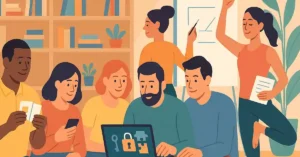Spoiler: you don’t outgrow the itch to learn—you just need better toys. Below are nine science-supported activities I’ve tested (sometimes on myself) that make adult learning stick, feel fun, and fit a busy schedule.
1. Micro-Learning Bursts
When my attention span feels shorter than an espresso shot, I lean on micro-learning—5- to 10-minute lessons delivered by podcast snippets, flash videos, or app cards. Studies show retention can climb to 20 % with micro-modules, double the rate of traditional hour-long lectures (facultyfocus.com). The trick is laser-focused objectives: one concept, one mini assessment, and I’m back to real life before my coffee cools.
Quick start: Record a 3-minute voice note explaining a single skill (e.g., “How to clear email inboxes with filters”) and replay it during lunch.
2. Spaced-Repetition Flashcards
Ever cram for something, ace it, then forget it faster than you can say “Where’s my phone?” Spaced repetition fixes that by scheduling reviews right before forgetting kicks in. Workplace studies report retention bumps of 25 %–60 % when adults use spaced digital decks instead of one-off readings (zenfidelearning.com).
Quick start: Load new vocabulary or formulas into a free app like Anki. Set daily cards to five—yes, just five—to build a no-excuses habit.
3. Gamified Quests
Points, leaderboards, and a sprinkle of dopamine keep me hitting “next level” even on tough content. A 2021-24 meta-analysis found gamification increases motivation and academic performance across adult cohorts (researchgate.net). Duolingo’s owl may nag, but 74 % of users credit its streak feature for sticking with language study (theverge.com).
Quick start: Turn a certification syllabus into a quest log: each chapter cleared earns 10 XP; a full module scores a coffee voucher.
4. Peer-Learning Circles
Conversation is memory’s best glue. Peer Learning Circles (PLCs) pair small groups for rotating “teach and discuss” sessions, boosting skill transfer and social capital in corporate and community settings (contemporaryleadership.com).
Quick start: Gather three colleagues for a 30-minute weekly huddle. Each person brings one new insight, explains it for five minutes, and fields questions. Tower-of-Jenga not required.
Master Speed Reading and Memory
Unlock the secrets of speed reading and memory mastery. This practical guide helps you boost your reading speed, sharpen recall, and learn smarter—starting today.
5. Teach-Back Sessions (The Protégé Effect)
I used to talk to rubber ducks (really) to debug code; that’s the protégé effect in action. Teaching forces deeper processing, leading to higher test scores than solo study (theguardian.com).
Quick start: After reading a chapter, record a short explainer video for an imaginary student—or your houseplant. Post if you’re brave; keep it private if you’re camera-shy.
6. Story-Based Scenario Simulations
Brains love a good story. Narrative learning weaves content into plotlines, helping adults link new ideas to lived experience and boosting recall (linkedin.com). Think choose-your-own-adventure but with budgeting, leadership, or cybersecurity dilemmas.
Quick start: Write a “day-in-the-life” scenario where a main character faces a problem your learners must solve step by step. Branch outcomes for bonus intrigue.
7. Move-and-Learn (Embodied Cognition)
Ten minutes of brisk movement can light up executive function better than another seat-bound slideshow (realsimple.com). A 2025 scoping review finds that embodied learning—pairing physical action with ideas—supports deeper concept formation in adults (frontiersin.org).
Quick start: Use a standing whiteboard sprint: sketch a concept while pacing, or give each key term its own yoga pose (yes, “down-dog data analysis” is a thing).
8. Digital Escape Rooms
Lock me in a virtual lab and make me solve clues? Sold. Recent mixed-methods research shows digital escape rooms drive engagement and knowledge gains in higher-ed and professional training alike (tandfonline.com).
Quick start: Build a free Google-Forms “breakout” with timed puzzles tied to your content—wrong answers keep the door shut.
9. Community Service Learning
Learning sticks when it matters to someone besides ourselves. Community-engaged service projects boost subject mastery, civic responsibility, and reflective thinking in adult learners (insights.aib.world).
Quick start: Pair a skills workshop (e.g., basic accounting) with volunteer tax-prep shifts. Real clients amplify the “why” behind the “how.”
Wrapping Up
Adult learning doesn’t need to mimic school desks and three-hour lectures. By mixing micro-lessons, movement, games, service, and a dash of storytelling, you can turn any goal—from mastering Photoshop to decoding quantum physics—into a habit that thrives long after orientation week.







